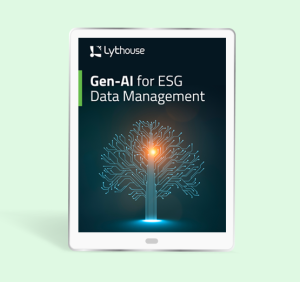
Introduction: The Role of AI in Modern ESG Strategies
Artificial intelligence (AI) is revolutionizing Environmental, Social, and Governance (ESG) strategies by automating complex data processes, enhancing efficiency, and improving the accuracy of sustainability programs. As businesses increasingly prioritize ESG initiatives, the integration of AI technologies like Lythouse AI becomes essential for effective data management and strategic decision-making.
Key Takeaways
- AI in ESG: AI enhances data collection, analysis, and reporting, driving sustainability initiatives.
- Lythouse AI Features: Focuses on automated data collection, advanced data analysis, and ensuring regulatory compliance.
- Benefits of AI: Highlights efficiency, accuracy, and scalability in ESG management.
- Case Study: Lythouse’s integration of Lythouse AI showcases the practical benefits and innovation in ESG data management.
Lythouse AI’s Core Features
Automated Data Collection
Lythouse AI simplifies the collection of ESG data across various sources, ensuring comprehensive data aggregation. Traditional methods of data collection often involve manual entry, which is time-consuming and prone to errors. Lythouse AI automates this process, pulling data from internal systems, external reports, and even real-time sensors. This automation ensures that all relevant data is captured efficiently, reducing the burden on staff and increasing the reliability of the data collected.
Data Analysis and Reporting
The system employs advanced algorithms to analyze data, generating reports that meet global ESG standards and support strategic decisions. These algorithms can identify trends, detect anomalies, and predict future outcomes based on historical data. This level of analysis provides organizations with deeper insights into their ESG performance, allowing them to make informed decisions that align with their sustainability goals.
For instance, Lythouse AI can analyze carbon emissions data to identify areas where reductions can be made or assess supply chain practices to ensure they meet ethical standards. The generated reports are not only comprehensive but also customizable to meet the specific needs of different stakeholders, whether they are internal managers, investors, or regulatory bodies.
Regulatory Compliance
Staying compliant with ever-changing ESG regulations is a significant challenge for many organizations. Lythouse AI continuously monitors global regulatory changes and updates its reporting frameworks accordingly. This ensures that the data and reports generated by the system are always compliant with the latest standards, reducing the risk of non-compliance and associated penalties. Organizations can focus on improving their ESG performance without worrying about falling behind regulatory requirements.
Benefits of Using AI in ESG Management
Efficiency and Accuracy
AI significantly reduces the need for manual data handling, minimizing errors and saving valuable resources. By automating data collection and analysis, AI systems ensure that data is processed faster and more accurately than human counterparts. This efficiency allows organizations to reallocate resources to other critical areas of their sustainability programs.
For example, a company might use the time saved through automation to engage more with stakeholders or to innovate new sustainable practices. The accuracy of AI-driven data management also means that reports are more reliable, providing a solid foundation for decision-making.
Scalability
AI systems like Lythouse AI can easily scale with an organization, accommodating increased data loads and complex analyses as sustainability efforts expand. As companies grow and their ESG data becomes more complex, traditional data management systems often struggle to keep up. AI, however, can handle large volumes of data effortlessly, making it an ideal solution for growing businesses.
Whether a company is expanding its operations globally or increasing its focus on detailed ESG metrics, AI ensures that data management remains efficient and effective. This scalability is crucial for organizations aiming to continuously improve their sustainability practices over time.
Download e-book on Gen-AI for ESG Data Management

Lythouse and Lythouse AI: A Case Study in Innovation
Integrating Lythouse AI into its platform, Lythouse has set new standards in ESG data management. Organizations leveraging this technology benefit from streamlined processes, enhanced data accuracy, and actionable insights, enabling them to achieve their sustainability goals more effectively.
Streamlined Processes
Lythouse’s integration of Lythouse AI has automated many of the manual processes traditionally associated with ESG data management. This automation has resulted in significant time and cost savings for businesses, allowing them to focus on strategic initiatives rather than data collection and processing.
Enhanced Data Accuracy
With Lythouse AI, Lythouse clients experience a higher level of data accuracy. The AI’s ability to process and analyze large volumes of data quickly and accurately means that reports generated are reliable and insightful. This level of accuracy is critical for making informed decisions and demonstrating transparency to stakeholders.
Actionable Insights
Lythouse AI provides Lythouse clients with actionable insights that drive their sustainability strategies. The AI’s advanced analytical capabilities allow organizations to identify key areas for improvement, set realistic goals, and track progress over time. These insights are crucial for continuously enhancing ESG performance and achieving long-term sustainability objectives.
Conclusion
AI, exemplified by Lythouse AI, is transforming the landscape of ESG data collection, analysis, and reporting. By automating these complex processes, AI not only enhances efficiency and accuracy but also ensures scalability as organizations grow. The integration of Lythouse AI into Lythouse’s platform showcases the practical benefits and innovation that AI brings to ESG management. As businesses continue to prioritize sustainability, leveraging AI technologies will be essential for achieving their ESG goals and maintaining competitive advantage in the market.

